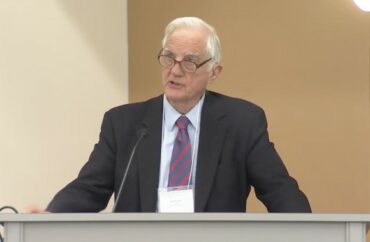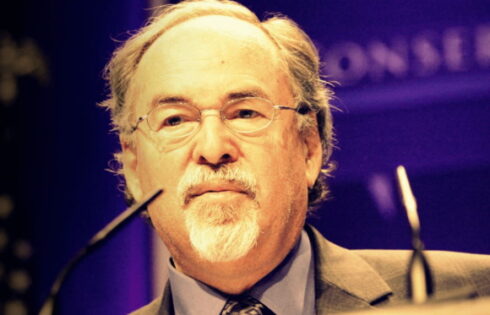
In a new book, a former president of Harvard University examines critiques of elite universities from both right and left and dismisses the charge that liberals are indoctrinating students.
Derek Bok was president of Harvard from 1971 to 1991 and interim president from 2006 to 2007, according to The Chronicle of Higher Education. His new book, ”Attacking the Elites: What Critics Get Wrong — and Right — About America’s Leading Universities,” was recently published by Yale University Press.
Regarding colleges and universities in recent years, Bok (pictured) wrote that “the views of critics on both sides of the political spectrum, and even of members of the elite’s own faculties and student bodies, have been decidedly negative.”
“Equally striking has been the near absence of any response to the criticism by those who speak for the universities under attack,” he stated.
In examining the conservative critique of universities, Bok acknowledged that the well-documented overrepresentation of liberal faculty on college campuses means that colleges “are likely to lose something valuable.”
“The quality of conversations about politics, economics, and society in general is bound to benefit if the participants hold different beliefs about what considerations need to be taken into account and how much weight to accord to each of the various factors that bear on a final judgment,” he wrote.
He also stated that the absence of conservative professors may increase political polarization and the neglect of civil discourse in the broader culture.
While Bok agreed that liberal professors far outnumber conservatives on college campuses, he stated that this overrepresentation “does not prove that liberals indoctrinate their students.”
“Why Americans Love to Hate Harvard,” an essay by Derek Bok, author of Attacking the Elites: What Critics Get Wrong—and Right—About America’s Leading Universities, is now available in @HarvardMagazine #harvard #university #college #ivyleague https://t.co/922uCc59rx
— Yale Univ Press (@yalepress) February 23, 2024
But Samuel Abrams, a professor at Sarah Lawrence College and a senior fellow at the American Enterprise Institute, disagreed.
Bok “is one of the most ethically honest boosters of higher ed and critical thinking,” Abrams, a professor at Sarah Lawrence College and a senior fellow at the American Enterprise Institute, told The College Fix in a phone interview. “He’s one of the greats. Yet he’s wrong about this.”
“He’s setting it up in such a way that is very hard to refute,” Abrams said. “In terms of indoctrination, do we have proof systemically? The answer is no. We don’t have systemic survey data.”
“However, we rarely see evenhanded syllabi and assignments,” Abrams said. “They absolutely exist and there are some liberal and conservative faculty who hold viewpoint diversity as sacred and teach a multitude of views, but so many simply fail at this core tasks.”
For example, after the Oct. 7 Hamas terrorist attack on Israel, many gave extra credit and time off for students to attend pro-Palestinian rallies and events, he said.
“When a professor says there’s extra credit if you attend this, that’s setting an agenda,” Abrams told The Fix. “We have hundreds if not thousands of cases of this.”
“The other thing that we know, and this is thanks to my work with [the Foundation for Individual Rights and Expression], is that liberal professors shut down dissent,” he said. “There is no question that students are afraid to speak. Which students are afraid to speak more than others? Conservatives and those on the right. Conservatives hide their views.”
“If students are afraid to talk and you promote a monoculture in the classroom, that is indoctrination,” he said.
MORE: UC Berkeley instructor offered students extra credit to attend anti-Israel protest
Bok could not be reached for comment.
The Foundation for Individual Rights and Expression found in its 2024 campus free speech survey that many students at America’s top colleges, particularly conservatives, are censoring their opinions.
“A quarter of students said they self-censor ‘fairly often’ or ‘very often’ during conversations with other students,” according to the report. “Twenty-seven percent of students said they self-censor ‘fairly often’ or ‘very often’ during conversations with professors, and 28% said they do so ‘fairly often’ or ‘very often’ during classroom discussions. A quarter of students reported that they are more likely to self-censor on campus now — at the time they were surveyed — than they were when they started college.”
Even more, “differences between liberal, moderate, and conservative students were starker than differences by sex or race,” according to the rankings report. “More than 1 in 3 conservative students (37%) reported feeling pressure to avoid discussing controversial topics, while 30% of moderate students and 19% of liberal students reported the same.”
Asked to speak to the issue of liberal indoctrination, the Foundation for Individual Rights and Expression offered a nuanced view.
“Bok’s assertion that there is a lack of conclusive evidence of liberal indoctrination of students by faculty is correct,” Sean Stevens, FIRE’s chief research advisor, told The Fix in an email.
“That being said, I would say it is a problem that a good portion of conservative students feel like they have to modify their views to protect their grades, whether or not they actually have to, as it says something about the climate for free expression on campus,” Stevens wrote.
MORE: MIT faculty ‘increasingly afraid to express their views,’ survey finds
IMAGE: Johns Hopkins University/YouTube
Like The College Fix on Facebook / Follow us on Twitter





Please join the conversation about our stories on Facebook, Twitter, Instagram, Reddit, MeWe, Rumble, Gab, Minds and Gettr.